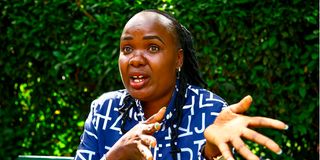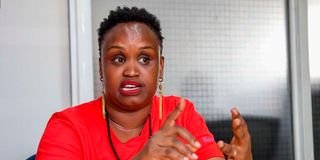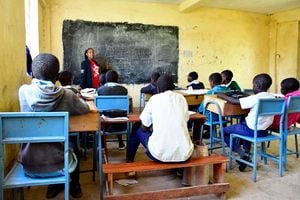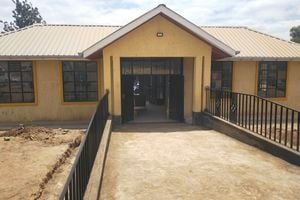
It may look like work taking care of a child with special needs, but the smile and determination on their faces is heavenly.
As Caroljoseph Emoyo lifts her son from the bed and heads to the living room, the pride in the mother’s eyes is evident.
Her son, Bahati Joseph, aged 13, has cerebral palsy and has been through a lot in life. But despite the odds stacked against him, he fights on.
Taking care of the boy might look like work for some, but for Caroljoseph, she does it with admirable grace, because she knows she is raising a champion.
Owing to his condition, Caroljoseph has to help him to do activities that his agemates do with ease like feeding, moving around, and brushing his teeth.
This has become a daily routine for the mother and son for more than a decade. A real mother’s sacrifice.
“Bahati was not born with cerebral palsy; he suffered meningitis at the age of six months and was admitted at Kenyatta National Referral Hospital for about three months. After being in the intensive care unit for two weeks, the paediatrician told me that Bahati had a condition called cerebral palsy. I did not know what that was but I was heartbroken because I saw how it had affected his growth and development,” recalls Ms Caroljoseph.

Caroljosephs Emoyo mother to a child with Cerebral Palsy condition during an interview at Memorial Park Nairobi on January 30, 2024.
Bahati, the second born child, does not go to school unlike his two siblings aged 15 and 3 who are in secondary school and kindergarten respectively.
The mother says she had enrolled him in school, but he had to stop because the pressure was taking a toll on him. Though now Caroljoseph has accepted her son’s condition, she says it has been a journey.
“I was in denial at first for three years and thought after a while, Bahati would be well but it never happened. He has had his high and low moments and every day is a learning journey,” says the mother-of-three.
When he was diagnosed with cerebral palsy, Bahati lost on most milestones that he had already achieved by six months like sitting down on his own and holding his head firmly.
He could not even say the word “Mama” and that broke the mother’s heart. But she is determined to see him make progress however small.

Monica Sunguna, Head of Operations for Peter James Association and a mother to a child with Cerebral Palsy condition during an interview at Nation Center, Nairobi on January 30, 2024.
“When he got sick, his neck was affected, causing the head to slant, the hands could not move and he had no feelings on the skin. We are learning everything afresh,” the mother says.
While Caroljoseph accepted Bahati’s condition, she reveals that her husband was crushed by the situation and died two years ago. Now a single mother, her life revolves around taking care of her special son and his two siblings.
“Initially, we used to do three therapy sessions twice a week, but we have reduced it to once a week because it is expensive and I do not have a stable source of income,” she says. Like Caroljoseph, elsewhere in Ruiru is Renah Atieno, a mother who is also taking care of a cerebral palsy baby. Renah is a single mother to Alexa Natasha aged four.
The Nation team met her a day after her daughter was discharged from the hospital. She says this has been their life since she gave birth to her baby.
“Her cerebral palsy condition was caused by jaundice infection when she was three days old while we were still in hospital. It was a big blow to me,” Renah says. To improve her quality of life, the mother says the child is on anticonvulsant medicines which are given every morning at eight before breakfast, making her presence around the baby crucial.
“She is growing taller and becoming heavier, but I have to carry her because she can’t move and I can’t leave her behind since I have not employed a nanny to take care of her. Feeding her is hectic, she struggles to sleep at night, she is restless and gets infections regularly because of her low immunity. But she fights on,” says the mother.

Damaris Musyoka, mother of one child with Cerebral Palsy condition during an interview at Memorial Park Nairobi on January 30, 2024.
On-and-off hospital visits
The on-and-off hospitals that require Ms Renah to take care of her baby made her quit her customer attendant job at a petrol station and now sells undergarments online.
For her, it is a day at a time, and hopes that baby Natasha’s health condition will improve as she continues to grow.
“The hospital admissions are regular and I hope that this will come to an end. I am not sure whether my baby will walk, but I will never stop playing my role as a mother,” she says.
Another parent doing amazing work raising a cerebral palsy child is Hezbon Onyango from Githurai 45 in Nairobi county.
Hope Victoria, 6, started school last year and she enjoys it. The PP 2 learner at Eube Academy has a bright face that conceals the burden she has carried since birth. The nurse who assisted her mother at the hospital noticed something unusual on the night she was born. She did not cry as newborns typically do, making her situation an emergency.
“My daughter was on medication for seven months before I knew what the medics were treating. One day I stopped giving her medication and she convulsed. When we rushed her to the hospital, the doctor told me that my daughter has a condition called cerebral palsy and not giving her medication risked her life,” says the father-of-two.
Maintaining medication and therapy plus the on and off hospitals is a costly affair for Hezbon, but he is not about to give up.
“This journey is tiresome and draining. Imagine getting money but you can’t have any development because it’s all going to treatment. My wife is not here because she has gone to wash people’s clothes so that we can get money for food,” says the father.
Hezbon earns money through welding, which is a casual job. His earnings go towards therapy and other medications. He hopes to own his workshop, but this has not been possible due to a lack of funds. He is indeed a cerebral palsy father champion.
“I am a proud dad despite the condition which has affected the growth of my child and her speech.”
What causes cerebral palsy
Cerebral palsy is an injury to the brain that happens during or after birth. According to health experts, the condition occurs among children whose brains are deprived of oxygen.
Scientists say prolonged labour leading to a child being delivered tired, is one of the causes of the condition. Other causes according to experts are blood clots in the brain as a result of a physical injury that damages part of the child’s brain or delayed treatment of infections that damage the brain.
“A child must cry when they are born. That cry helps to expel fluid from the lungs. When the child is in the mother’s womb, they are not using their oxygen but from the mother through the umbilical cord and are supposed to use their oxygen when they come out. Their lungs are not properly developed, so when they cry, they pull in that oxygen that nourishes the brain,” says Elisha Mutsotso, assistant occupational therapist.
First oxygen is important and if the child is tired and does not cry to pull in that oxygen it means there will be brain damage. It is the brain that controls the body functions and if it is affected at that early stage, that child will have cerebral palsy,” explains Mutsotso.
According to Mutsotso, expectant mothers cannot detect whether their unborn babies will have cerebral palsy or not.
When they go for a scan, everything looks fine, and the problems usually occur during the labour period. He adds that there is no cure for cerebral palsy, but some treatments can help patients manage the symptoms and improve their well-being.
“Anticonvulsant medication helps in managing convulsion so that the baby can be okay. Physical therapy prevents the condition from worsening and if there is something to correct the deformities, it is done so that they do not worsen. If they worsen, they shorten the lifespan of the victim,” says the expert.










